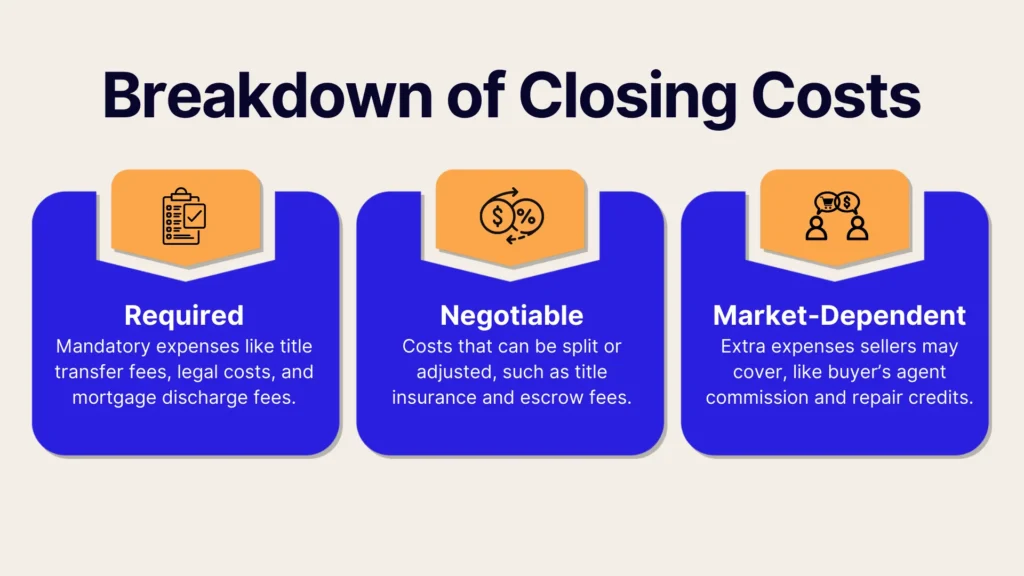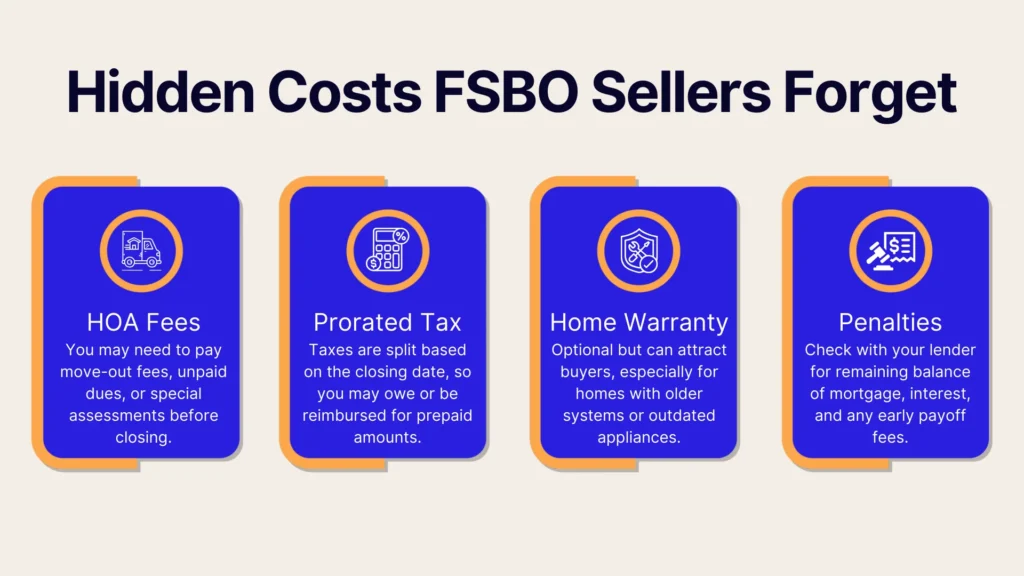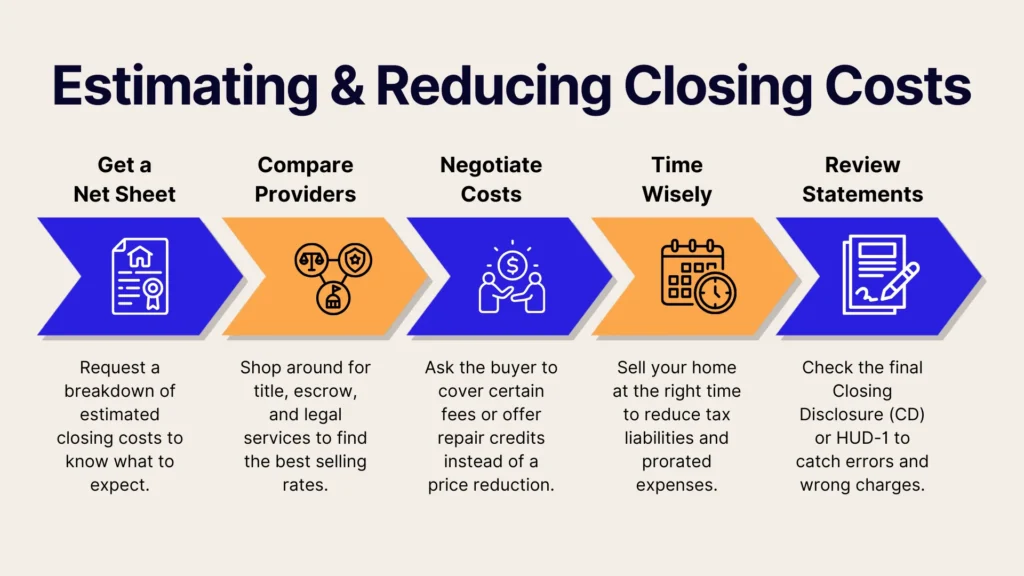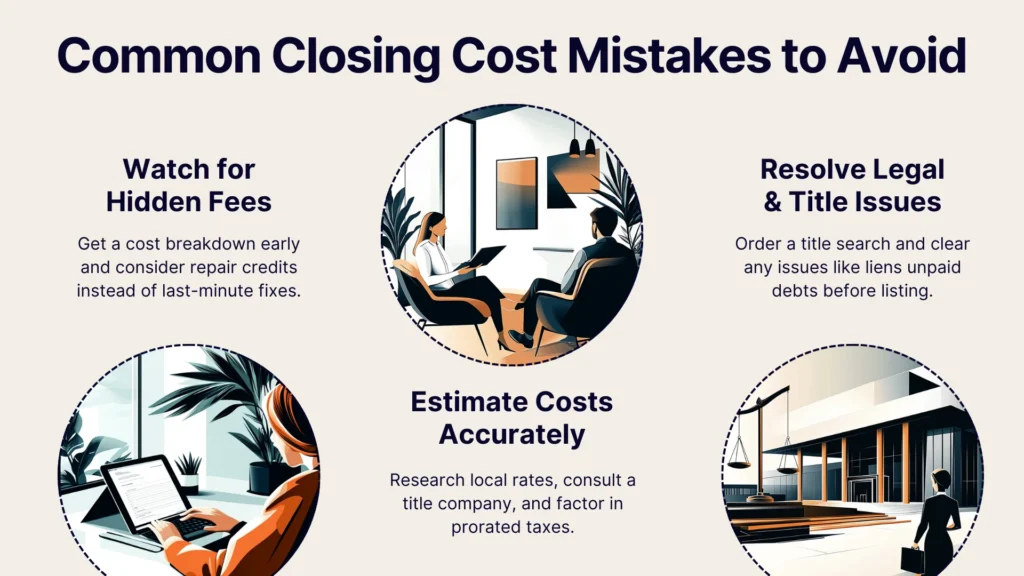Selling your home without a real estate agent? That means more control—and more money in your pocket. But before you start celebrating, there’s one expense you can’t ignore: closing costs. Even as an FSBO seller, you’ll still have fees to cover when finalizing the deal.
From legal fees to title insurance, these costs can add up if you’re not prepared. The good news? Knowing what to expect can help you plan and avoid surprises. Let’s break down the key closing costs FSBO sellers should budget for so you can walk away with the most profit possible.
Definition of Closing Costs
Closing costs are the fees and expenses buyers and sellers must pay to finalize a real estate transaction. Understanding these costs is crucial to accurately budgeting and maximizing profits as an FSBO seller.
Closing costs typically include legal fees, title insurance, transfer taxes, and escrow or settlement fees. Sometimes, sellers may also cover prorated property taxes or HOA dues. While buyers usually pay for home inspections and appraisals, sellers often face agent commission fees (if applicable), mortgage discharge fees, and government filing costs.
For first-time sellers, closing costs can be an unexpected expense. Failing to plan for them can affect your bottom line or cause last-minute delays. Knowing what’s required in your area helps you set a realistic selling price, negotiate confidently, and avoid surprises when finalizing the sale.

Why Closing Costs Matter
Closing costs directly impact the amount of money you walk away with after selling your home. Many FSBO sellers focus on their home’s sale price but overlook these final expenses, which can reduce their net proceeds if not adequately accounted for.
One key factor is that closing costs are often shared between buyers and sellers, but the specific breakdown depends on local laws and negotiations. Some sellers assume the buyer covers all costs, which isn’t always true. For instance, sellers are typically responsible for:
- Title transfer fees
- Legal costs
- Mortgage discharge fees
In competitive markets, buyers may also negotiate for sellers to cover additional costs, such as:
- Title insurance
- A portion of escrow fees
Misunderstanding who pays for what can lead to unrealistic profit expectations or last-minute financial stress. By knowing what to expect and planning accordingly, FSBO sellers can price their home wisely and avoid unexpected deductions from their final payout.
Common Components of Closing Costs
Closing costs include several fees and taxes that sellers must pay before officially transferring home ownership. Understanding these expenses helps FSBO sellers budget accurately and avoid last-minute surprises. Here’s what to note.
Title and Escrow Fees
- Title search: ensures no outstanding claims or liens on the property.
- Title insurance: protects both buyer and lender from future ownership disputes.
- Escrow services: handle the secure transfer of funds and documents, ensuring a smooth closing process. Fees vary based on location and service providers.
Attorney and Legal Fees
Some states require an attorney to oversee real estate transactions, while in others, it’s optional but recommended. Attorneys review contracts, handle legal paperwork, and ensure compliance with state laws.
Costs vary by state and complexity, ranging from a flat fee ($500–$2,000) to hourly rates.
Recording and Transfer Taxes
Local governments charge recording fees to register the sale officially. Transfer taxes vary by state, province, or municipality and are typically based on the home’s sale price. Some areas offer exemptions or reduced rates for primary residences, so FSBO sellers should check local regulations to estimate their tax obligations.
Real Estate Agent Commissions (If Applicable)
FSBO sellers typically avoid listing agent commissions (around 5-6%), which can result in significant savings. However, if the buyer has an agent, sellers may still need to cover the buyer’s agent commission (usually 2-3%) to attract more offers. Negotiating lower commission rates or offering a flat fee can help reduce costs while still making the property appealing to agent-represented buyers.

Additional Costs That May Arise
In addition to standard closing costs, FSBO sellers should be aware of other potential expenses before finalizing the sale. These costs vary based on location, property type, and contract terms.
Homeowners Association (HOA) Fees
If your home is part of an HOA, you may be responsible for:
- Transfer or move-out fees, which HOAs charge to update ownership records.
- Unpaid dues that must be settled before closing.
- Special assessments, which are one-time fees for community improvements or repairs.
You must check with your HOA early in selling to understand any outstanding obligations.
Prorated Property Taxes
Property taxes are typically split between the seller and buyer based on the closing date. If taxes are paid annually or semi-annually, sellers may need to:
- Reimburse the buyer for any prepaid property taxes covering a period after the sale.
- Pay the buyer’s portion if taxes haven’t been paid yet and are due after closing.
The timing of your sale affects how much you owe, so checking with your local tax authority can help estimate the proration amount.
Home Warranty Costs
Some FSBO sellers offer a home warranty as an incentive for buyers. A home warranty typically costs $300–$600 and covers major appliances and systems for a year.
Advantages:
- Attracts buyers who want extra peace of mind.
- May help sell older homes with aging systems.
Disadvantages:
- Adds an extra expense for the seller.
- Buyers may still request repairs or negotiations despite the warranty.
Offering a home warranty is optional but can be a helpful selling tool in competitive markets.
Mortgage Payoff and Prepayment Penalties
Before closing, sellers must request a mortgage payoff statement from their lender. This statement includes the remaining loan balance and any accrued interest. Some loans also include prepayment penalties or fees for paying the mortgage early.
To avoid surprises:
- Check your loan agreement for prepayment clauses.
- Request a final payoff amount to ensure accurate closing calculations.
Understanding these potential costs helps FSBO sellers prepare for closing and avoid unexpected financial setbacks.
Estimating Your Closing Costs
Knowing your estimated closing costs helps you plan ahead and set a realistic selling price. As a FSBO seller, having a clear financial picture ensures you maximize your net proceeds without surprises.
Importance of a Seller’s Net Sheet
A Seller’s Net Sheet is a breakdown of all expected fees, taxes, and other deductions from the sale price, helping you estimate your final take-home amount. It typically includes:
- Mortgage payoff balance (if applicable).
- Title, escrow, and legal fees.
- Transfer taxes and prorated property taxes.
- HOA fees or other property-related costs.
- Real estate agent commission (if offering a buyer’s agent fee).
Creating a net sheet gives you a clearer picture of what you’ll walk away with after closing. Many title companies or attorneys can help you draft an accurate estimate.
Consulting Professionals
Even as a FSBO seller, consulting real estate attorneys, CPAs, or title companies can help clarify state-specific costs. These professionals can:
- Ensure compliance with local tax and legal requirements.
- Identify potential tax benefits or deductions.
- Provide an accurate estimate of closing fees.
Local real estate boards, county tax offices, and financial advisors are reliable state-specific resources. Checking with these sources can prevent costly miscalculations.
Online Tools and Calculators
Many reputable websites offer closing cost calculators to give FSBO sellers a ballpark estimate. These tools typically factor in:
- Sale price and location.
- Loan payoff amounts.
- Estimated taxes and fees.
However, online calculators have limitations—they may not account for state-specific fees or negotiated costs. Always verify estimates with a title company or attorney to ensure accuracy.
Reducing or Managing Closing Costs
While closing costs are unavoidable, FSBO sellers have several strategies to minimize expenses and keep more profit from their sale. You can reduce or manage these costs with thoughtful planning and negotiation.

Shop Around for Service Providers
Not all title companies, escrow agents, and attorneys charge the same fees, so comparing multiple providers can help you save money. To get the best rates:
- Request quotes from at least three service providers in your area.
- Ask for a detailed breakdown of fees to spot any unnecessary charges.
- Check online reviews and ratings to balance costs with quality service.
Many states allow sellers to choose their title company or closing agent, so taking time to compare can result in significant savings.
Timing Your Sale Strategically
The timing of your sale can influence your closing costs, tax obligations, and negotiating power. Consider these factors when planning:
- End-of-year sales may help you reduce tax liabilities if selling impacts capital gains.
- Market conditions can affect buyer demand, but selling in a seller’s market gives you more leverage to negotiate costs.
- Property tax cycles vary by state, so closing before a new tax period may reduce prorated tax costs.
FSBO sellers can optimize their financial outcome by strategically choosing when to sell.
Negotiation Tactics
One of the most significant advantages of selling FSBO is the flexibility to negotiate closing costs directly with buyers. Consider these tactics:
- Request that the buyer cover certain costs, such as title insurance or escrow fees, especially in a competitive market.
- Offer repair credits instead of a price reduction—this keeps your sale price higher while still addressing buyer concerns.
- Negotiate commission terms if the buyer has an agent, potentially reducing the percentage or opting for a flat fee.
By being strategic with negotiations, FSBO sellers can reduce expenses while maintaining an attractive deal for buyers.
Impact on Your Final Profit
Understanding how closing costs affect your bottom line is crucial for FSBO sellers. While you may save on listing agent commissions, other fees can still reduce your net proceeds. You can maximize your final profit by carefully balancing price, expenses, and market conditions.
Balancing Price and Expenses
A higher sale price can help offset closing costs, but you must be realistic about your net profit after deducting all expenses. While setting an ambitious asking price may seem like a good strategy, overpricing can lead to fewer offers and a longer time on the market. Instead, consider your total costs—title fees, taxes, and potential buyer incentives—to determine a fair but profitable listing price. The goal is maximizing earnings without creating financial roadblocks that slow your sale.
Considering the Local Market
The state of the real estate market plays a significant role in who covers what closing costs. In a seller’s market, where demand is high, you have more leverage to negotiate fewer seller-paid costs or even pass some fees to the buyer. However, in a buyer’s market, where homes take longer to sell, you may need to be more flexible—offering to cover specific fees could make your property more attractive. Understanding local trends and buyer expectations can help you decide where to stand firm and where to offer concessions to close the deal.
Reviewing the Settlement Statement (HUD-1 or CD)
Before closing, you’ll receive a Settlement Statement (HUD-1 or Closing Disclosure/CD) that outlines all final costs and payments. Reviewing this document carefully is essential to ensure no unexpected charges or errors. Check that:
- All agreed-upon costs match what was negotiated.
- Prorated property taxes and any HOA fees are calculated correctly.
- Mortgage payoff amounts reflect the latest figures from your lender.
Any discrepancies should be addressed with the title company or closing agent before signing. Reviewing the final numbers prevents last-minute surprises and ensures you receive the correct proceeds.
Common Pitfalls and How to Avoid Them
FSBO sellers can maximize their profits by planning for closing costs, but unexpected expenses can still arise. Hidden fees, miscalculated taxes, and legal complications can eat into your final proceeds if you’re not careful. Here’s how to avoid common pitfalls and keep your closing process smooth.
Hidden Fees
Some closing costs may not be evident initially but can add up quickly. Common hidden fees include:
- Lender charges like loan payoff processing fees or wire transfer fees.
- Appraisal costs if a buyer requires a second opinion before proceeding.
- Inspection-related expenses, such as mandatory repairs that arise after a buyer’s inspection.
To avoid surprises, request a breakdown of potential costs from your lender and title company early. Consider offering repair credits if an inspection reveals issues instead of completing costly last-minute fixes.
Underestimating Taxes and Transfer Fees
Every region has different property tax rates and transfer fees, and miscalculating them can lead to unexpected expenses at closing. You may need to cover the difference out of pocket if you underestimate these costs.
To prevent this:
- Research your local tax obligations before setting your selling price.
- Consult a title company or tax professional to calculate exact amounts.
- Factor in prorated taxes so you’re not caught off guard by mid-year payments.
Being precise with these figures ensures that your final net proceeds align with expectations.
Ignoring Legal or Title Issues
A property with unresolved legal matters—such as liens, ownership disputes, or unpaid judgments—can create costly delays and higher closing expenses. If a title issue surfaces late in the process, you may have to pay extra legal fees or lose a buyer altogether.
To avoid this:
- Order a title search early to identify any red flags.
- Clear any liens or debts before listing the property.
- Consult an attorney if needed to resolve disputes before closing.
By addressing potential legal or title issues in advance, FSBO sellers can ensure a smoother transaction and avoid costly last-minute complications.

Conclusion
Closing costs are unavoidable when selling a home, but FSBO sellers who plan can minimize expenses and maximize their net proceeds. Understanding what costs to expect, how to estimate them accurately, and where to negotiate or cut unnecessary fees ensures a smoother and more profitable closing process.
Whether shopping around for service providers, strategically timing your sale, or reviewing your settlement statement carefully, taking a proactive approach helps prevent last-minute surprises. By staying informed and prepared, you can confidently navigate closing costs and walk away with the best possible financial outcome from your FSBO sale.
